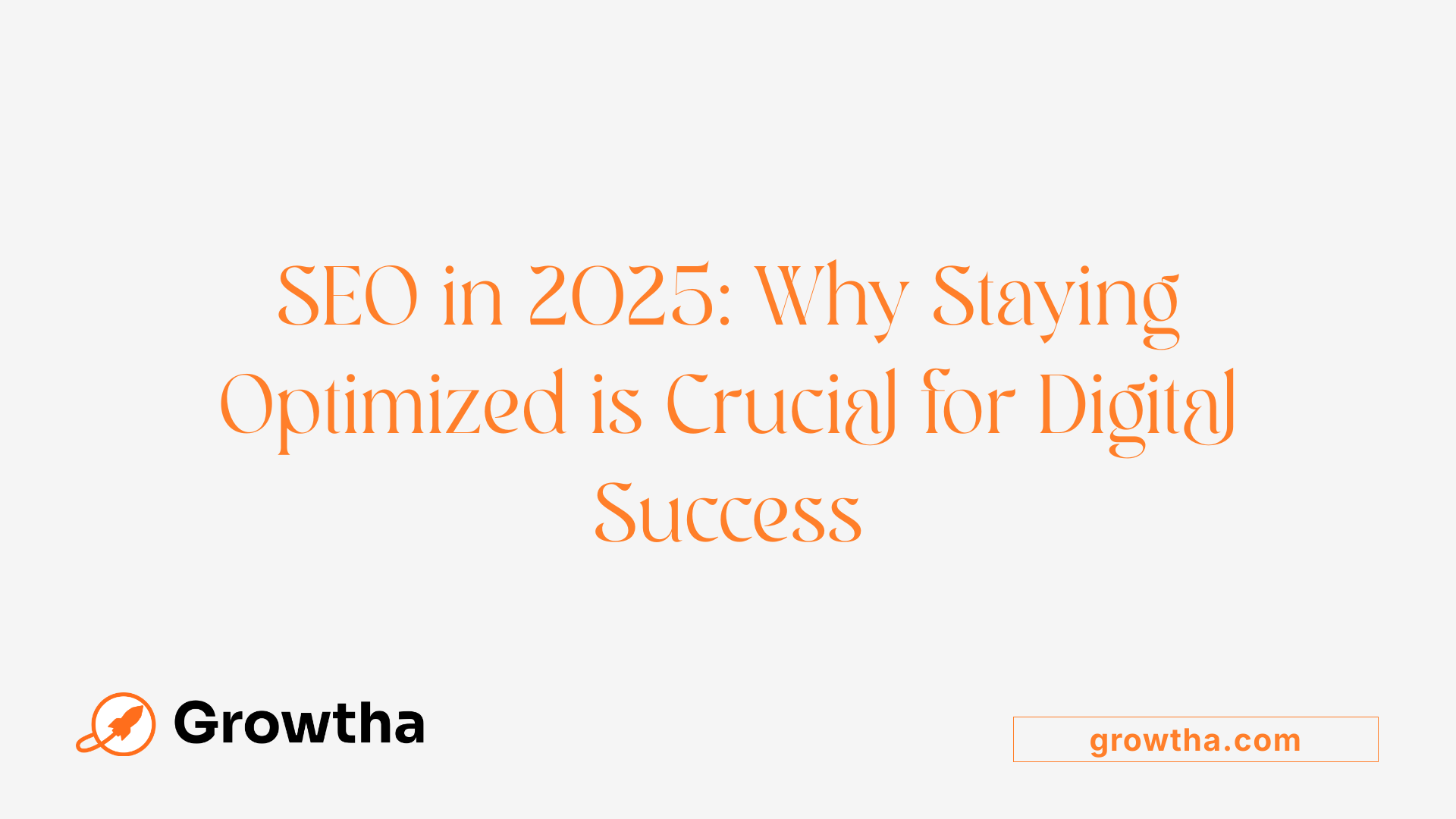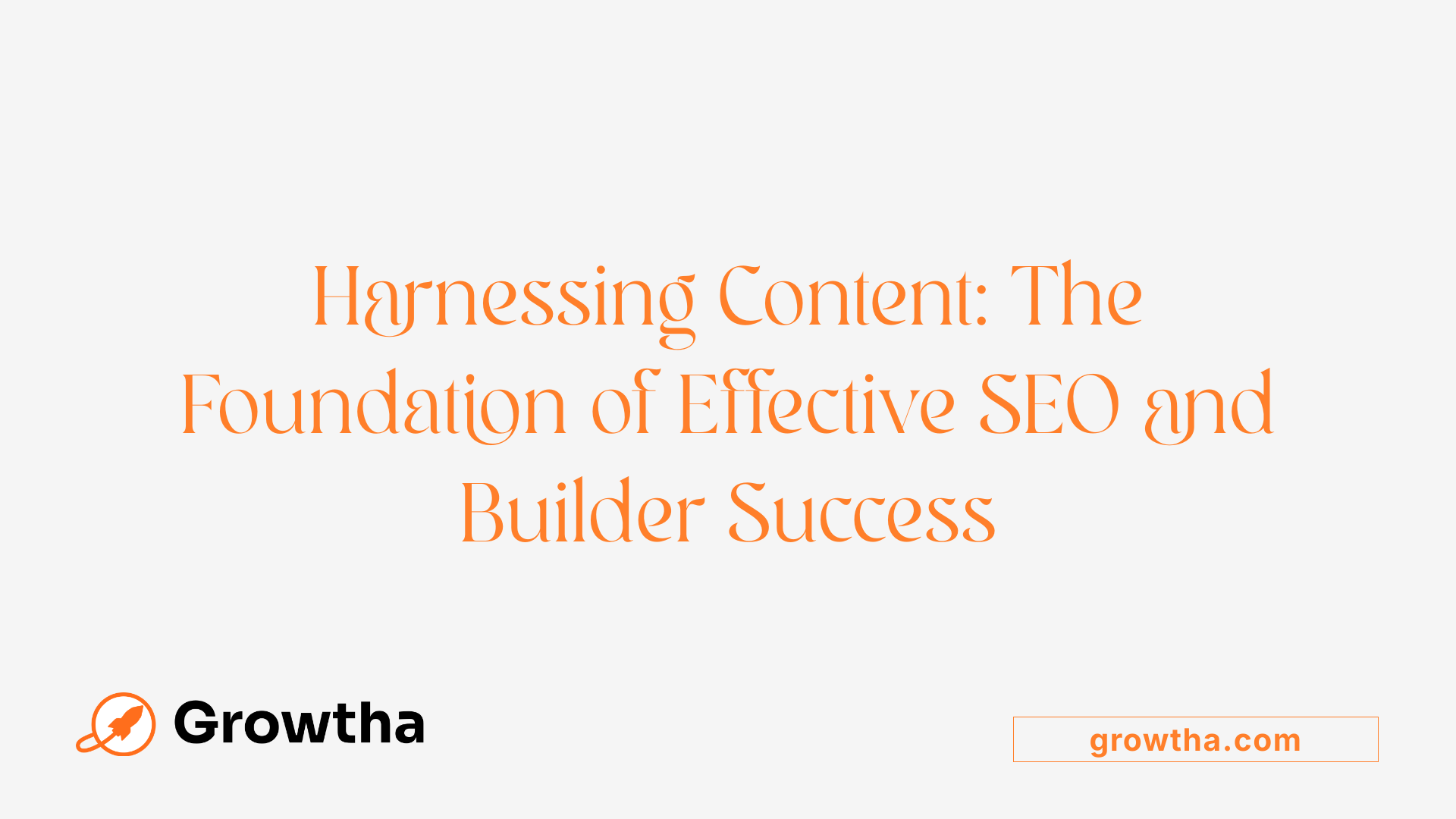Which Website Builder Has the Best SEO?
Unveiling the Top SEO-Optimized Website Builders of 2025


Which Website Builder Has the Best SEO?
Understanding the Significance of SEO in Website Building
As digital competition intensifies, selecting a website builder that excels in SEO is paramount for businesses and content creators aiming to improve their visibility, organic traffic, and search engine rankings. With a multitude of platforms available, it becomes essential to evaluate their SEO capabilities comprehensively. In this article, we explore and compare the leading website builders designed for SEO effectiveness in 2025, emphasizing their features, strengths, limitations, and suitability for different user needs.
Wix: The Leading All-Round SEO Platform
Which built-in SEO tools does Wix offer?
Wix excels as a comprehensive SEO website builder thanks to its extensive set of built-in tools. It provides features such as sitemap management, colorful meta descriptions, customizable URLs, image Alt attributes, header code, and social media integrations. These tools help ensure that websites are optimized for search engines directly out of the box.
How does SEMrush integration enhance Wix SEO?
One standout feature of Wix is its direct integration with SEMrush, a leading SEO research tool. This connection allows users to identify relevant keywords, analyze competitors, and track search performance—all from the Wix dashboard. This seamless integration simplifies the SEO process by providing actionable insights without needing to leave the platform.
What is the role of the SEO Learning Hub?
Wix also offers an SEO Learning Hub, an educational resource that helps users improve their SEO understanding. Through tutorials, tips, and best practice prompts, beginners and experienced users alike can optimize their websites more effectively. This support system makes Wix accessible to users with varying levels of SEO expertise.
Which comprehensive SEO features does Wix provide?
Wix supports all essential SEO functions, making it ideal for a broad range of website types. It includes features like server-side rendering, XML sitemaps, URL redirect management, Google Search Console and Analytics integrations, image compression for faster load times, and SEO APIs through Velo. Additionally, Wix supports multilingual websites, supporting 180 languages—more than many competitors—helping reach global audiences.
How does Wix support multilingual websites?
Supporting 180 languages, Wix makes it straightforward for users to build multilingual websites. This extensive language support is crucial for businesses aiming to reach diverse markets, ensuring that content is optimized and accessible in multiple languages. Such multilingual capabilities are an advantage that positions Wix above many other builders.
What AI-driven SEO features are available?
Wix has incorporated AI features like the Wix AI Website Builder and AI Text Generator. These tools assist in creating optimized website content, suggest improvements, and automate tasks such as content creation and image optimization. The AI capabilities help save time and improve SEO results, especially for users who may not have extensive technical knowledge.
| Feature Category | Details | Additional Support |
|---|---|---|
| Built-in SEO Tools | Sitemap management, meta descriptions, URL customization, image Alt text | Easy editing, mobile optimization |
| SEMrush Integration | Keyword research, competitor analysis, SEO tracking | Improves keyword targeting |
| Educational Resources | SEO Learning Hub, tutorials, best practices | Guides for all skill levels |
| Multilingual Support | Supports 180 languages | Reach global markets |
| AI-Driven Features | Wix AI Website Builder, AI Text Generator | Automates content and image SEO |
| Advanced Capabilities | Server-side rendering, XML sitemaps, redirect manager | Enhanced website performance |
Overall, Wix’s reputation as the top SEO website builder in 2025 stems from its balanced mix of comprehensive features, ease of use, and innovative AI tools. Its integration with trusted tools like SEMrush and educational support through the SEO Learning Hub ensures that users are well-equipped to promote their websites effectively in competitive search landscapes.
Why SEO Matters More Than Ever

How do different website builders support search engine ranking improvements?
Website builders play a vital role in helping users improve their search engine rankings by providing essential SEO tools and features. These platforms support site optimization through responsive templates, ensuring websites are mobile-friendly—a factor increasingly favored by search engines.
Most builders include options to create clean, structured URLs, which make it easier for search engines to crawl and index web pages. Fast-loading websites are also prioritized, with many builders offering performance optimization features like image compression and server-side rendering.
In addition, SEO-supportive website builders facilitate the addition of structured data, meta tags, and optimized content to enhance search visibility. Tools for managing sitemaps and integrating analytics enable continuous monitoring and improvement.
Platforms such as Wix and Squarespace come with built-in SEO dashboards and prompts to guide users through best practices. WordPress, with its extensive plugin ecosystem, offers advanced options like Yoast SEO and Rank Math to fine-tune SEO strategies. Shopify provides optimized product pages, internal linking, and schema markup suited for eCommerce.
With these features, website builders empower users—regardless of technical expertise—to implement effective SEO strategies, boost visibility, and attract organic traffic efficiently.
| Builder Platform | SEO Features | Focus Areas | Notable Tools/Integrations |
|---|---|---|---|
| Wix | SEO Wiz, structured data, rich customization | Mobile-Friendliness, Content Optimization | Google Search Console, SEMrush integration |
| Squarespace | XML sitemaps, meta tags, structured data | Site Speed, Clean Code | Built-in SEO panel, Google AMP support |
| WordPress | Plugins like Yoast & Rank Math, customizable themes | Content Management, Technical SEO | Extensive plugin ecosystem |
| Shopify | Product schema, internal linking, product SEO | eCommerce SEO, Internal Linking | Google Analytics, SEO apps |
| Hostinger | Automated sitemaps, AI SEO assistant | Performance, Speed | Google Analytics, AI Content Generator |
What are the benefits of strong SEO support from website builders?
Robust SEO support from website builders contributes to higher search engine rankings, leading to increased organic traffic. Optimized websites enjoy better visibility in search results, which builds brand credibility and trust.
Moreover, SEO-friendly platforms make it easier to adhere to best practices, saving time and resources. This support is especially valuable for small businesses and beginners who need guided assistance.
In summary, the combination of technical tools, tailored recommendations, and integrations makes these builders powerful allies in the ongoing effort to enhance search visibility and attract meaningful organic traffic.
| Benefits | Explanation | Platform Examples |
|---|---|---|
| Increased Traffic | Higher rankings mean more visits | Wix, WordPress |
| Improved Credibility | Search results from trusted sources | Squarespace, Shopify |
| Cost-Effectiveness | Organic traffic reduces paid ad costs | Hostinger, SITE123 |
| Easier Management | Built-in tools streamline SEO tasks | Weebly, GoDaddy |
Why is SEO more critical in 2025?
As digital competition intensifies, SEO remains a cornerstone of effective online marketing. With advanced algorithms favoring well-optimized sites, neglecting SEO can lead to lower visibility and missed opportunities.
In an era where users predominantly engage through mobile devices and voice searches increase, SEO strategies must adapt accordingly. Features like mobile responsiveness, fast load speeds, and structured data are now essential. Additionally, integrating AI and automation tools in website builders helps streamline SEO efforts, making optimization accessible even for non-experts.
Ultimately, investing in SEO through a capable website builder ensures a sustainable flow of organic traffic, supports brand growth, and enhances online reputation.
| Future Trends | Key Considerations |
|---|---|
| Mobile-First | Prioritizing responsiveness |
| AI & Automation | Simplifying SEO tasks |
| Structured Data | Enhancing rich snippets |
| User Experience | Website speed & usability |
By leveraging SEO features offered by leading website builders like Wix, Squarespace, and WordPress, businesses can position themselves strongly in the competitive digital landscape of 2025 and beyond.
Core SEO Features Every Website Builder Needs
What are the key SEO features offered by popular website builders?
In the competitive digital landscape of 2025, having a website builder equipped with fundamental SEO capabilities is essential for enhancing visibility and ranking on search engines. Popular platforms such as Wix, Squarespace, Shopify, and WordPress offer a range of features that facilitate effective SEO strategies.
One of the most important features is customizable URL structures. This allows users to create clean, keyword-rich, and descriptive links that are easier for search engines to crawl and index. Wix and Squarespace, for example, enable full control over URL paths, supporting keyword inclusion.
Mobile responsiveness is another critical element. With mobile-first indexing, search engines prioritize mobile-friendly websites. Builders like Wix, Squarespace, and Hostinger automatically ensure that sites are optimized for mobile devices, which is vital for maintaining and improving search rankings.
XML sitemaps are a backbone of effective SEO, allowing search engines to understand the website's structure better. Most top website builders automatically generate and update sitemaps. For instance, Squarespace and Shopify include this feature natively, ensuring efficient indexing.
Site speed optimization impacts both user experience and search rankings. Builders like Hostinger and Webflow focus heavily on fast load times through optimized code, image compression, and efficient server handling. These improvements minimize bounce rates and boost search performance.
Structured data, also known as schema markup, helps search engines interpret the page content better by providing context. Wix, Webflow, and Dorik support adding structured data, which enhances rich snippets in search results, increasing click-through rates.
| Feature | Builder Platforms | Advantages | Additional Notes |
|---|---|---|---|
| Meta tags | All major builders | Customize page titles, descriptions | Enhances relevance and click-through rates |
| URL structure | Wix, Squarespace, Webflow | Clean, keyword-rich URLs | Improves crawlability and user experience |
| Mobile responsiveness | Wix, Squarespace, Hostinger | Mobile-friendly design | Essential for ranking and user engagement |
| XML sitemaps | Squarespace, Shopify, GoDaddy | Automatic generation and updates | Facilitates search engine crawling |
| Site speed | Hostinger, Webflow | Reduced load times, optimized assets | Critical ranking factor |
| Structured data | Wix, Webflow, Dorik | Rich snippets and enhanced listings | Supports schema for products, articles, etc. |
What are the most common SEO features to look for?
When selecting a website builder, focus on core functionalities like customizable meta tags, flexible URL structures, and automatic sitemap generation. Make sure the platform also emphasizes mobile responsiveness and site speed. The ability to implement structured data seamlessly is a bonus for advanced SEO tactics.
Additionally, integration with analytics tools, such as Google Analytics and Search Console, provides insights into website performance and optimization opportunities.
In summary, the ideal website builder combines ease of use with robust SEO capabilities. This ensures that users can optimize their sites effectively without needing extensive technical knowledge, leading to better search engine rankings, more organic traffic, and overall online success.
Wix: The Leader in SEO Grace and Features

What is the integrated SEO Wiz in Wix?
Wix's SEO Wiz is a standout feature that guides users step-by-step through the process of optimizing their website for search engines. It helps in creating custom meta tags, titles, descriptions, and alt text for images. This user-friendly tool ensures that even beginners can systematically improve their website’s SEO without needing extensive technical knowledge.
How does Wix support custom meta tags and URLs?
Wix allows users to fully customize meta tags and URLs for each page, an essential aspect of on-page SEO. This flexibility helps improve search engine rankings by enabling precise control over how pages appear in search results. Users can tailor descriptions, set clean, keyword-rich URLs, and optimize each page to better match targeted search queries.
What mobile optimization features does Wix provide?
Since mobile-friendliness is a major factor in SEO rankings, Wix emphasizes responsive design. Wix websites are automatically optimized for mobile devices, ensuring fast load times and a seamless user experience. Users can also customize the mobile view independently, fine-tuning content and layout specifically for mobile users.
How does Wix support structured data and schema markup?
Wix supports structured data, which helps search engines better understand the content of a website. The platform offers easy-to-use tools and apps that enable adding schema markup for products, articles, reviews, and more. This enhances rich results in search listings, potentially increasing visibility and click-through rates.
How is Google Search Console integrated with Wix?
Wix integrates smoothly with Google Search Console, a vital tool for monitoring and optimizing a website’s presence in Google search results. Users can connect their site to Search Console directly from the Wix dashboard, gaining insights into search traffic, indexing issues, and keywords, all within a centralized platform.
What are the SEO practices recommended by Wix?
Wix promotes best practices such as optimizing site speed, using descriptive meta tags, creating clean and keyword-rich URLs, and maintaining mobile responsiveness. Its built-in tools guide users to regularly update content, fix broken links, and improve site structure. Additionally, Wix's integration with SEO plugins and analytics tools assists users in tracking and refining their SEO strategies.
| Features | Details | Additional Notes |
|---|---|---|
| SEO Wiz | Guided step-by-step website optimization | User-friendly for beginners |
| Custom Meta & URLs | Full control over page titles, descriptions, and URLs | Enhances on-page SEO |
| Mobile Optimization | Responsive design, customizable mobile view | Critical for SEO ranking |
| Structured Data Support | Easy schema markup insertion for rich search results | Increases visibility |
| Google Search Console | Direct integration for site performance monitoring | Essential for SEO tracking |
| SEO Best Practices | Speed, optimized content, clean URL structures | Constant updates and guidelines |
Why Wix Stands Out for SEO in 2025
Wix’s all-in-one approach, combining powerful built-in tools with guided optimizations, makes it the top choice for website owners prioritizing SEO. Its extensive features, ease of use, and continuous updates ensure that even those with limited technical skills can achieve strong search engine rankings.
Your SEO Toolkit: What the Giants Use
What are the key SEO features offered by popular website builders?
In 2025, various website builders have become essential tools for creating search engine optimized websites. Each platform offers a unique set of features designed to improve visibility and rankings on search engines.
Most popular builders, such as Wix, Squarespace, Shopify, and WordPress, include customizable URLs, which ensure clean and relevant links that help search engines understand your content better. Mobile responsiveness is another critical feature, ensuring websites display well across all devices, a factor that search engines prioritize.
XML sitemaps are automatically generated by many builders, making it easier for search engines to discover and index website pages. These builders often provide built-in SEO tools like keyword suggestions, schema markup integration, and simple-to-use SEO wizards or panels. For example, Wix's SEO Wiz guides users step-by-step through optimizing their sites.
Integration with analytics tools such as Google Analytics and Google Search Console is standard, enabling website owners to monitor site performance and identify areas for improvement. Social media sharing features are also included to help drive traffic from various channels.
Overall, these features collectively help in crafting a website that is not only user-friendly but also highly visible in search engine results.
Which SEO plugins do website builders support?
While some platforms like WordPress shine with support for over 50,000 plugins such as Yoast SEO, others offer native tools that cover most SEO essentials. Wix, for instance, includes an SEO Wiz and offers integrations with external tools like SEMrush, granting users insights into keyword targeting.
WordPress's strong ecosystem allows installing plugins like Rank Math and All in One SEO, automating tasks such as meta descriptions, 404 monitoring, and schema markup. These plugins are highly customizable and imperative for advanced SEO strategies.
Shopify and Squarespace focus on providing built-in SEO features but also support third-party app integrations for enhanced functionality, especially in eCommerce SEO.
How do site structure optimization and schema markup impact SEO?
Effective site structure ensures that search engines can crawl your website efficiently. Clear navigation, logical URL hierarchies, and internal linking are essential. Most builders automatically generate or allow customization of URLs, making them descriptive and keyword-rich.
Schema markup, or structured data, helps search engines understand your content more effectively. Platforms like Wix and Squarespace support schema markup for products, articles, and other content types, leading to rich snippets in search results. These rich snippets can improve click-through rates and provide better visibility.
Proper schema implementation is especially vital for eCommerce sites, where product information, reviews, and prices can be highlighted directly in search results.
What are the best practices for on-page optimization?
On-page SEO involves optimizing individual pages for targeted keywords and ensuring content quality. Key practices include using relevant meta titles and descriptions, headers (H1, H2, H3), and Alt text for images.
Platforms like WordPress, Wix, and Squarespace make editing these elements straightforward through their dashboards. Ensuring mobile-friendliness, fast load times, and optimized images also elevate on-page SEO.
Content should be structured logically with clear headings and internal links to related pages. Additionally, integrating social share buttons and customizing URLs enhance user engagement and indexing efficiency.
How important is speed optimization, and how do website builders support it?
Website speed is a decisive ranking factor, particularly on mobile devices. Slow-loading sites suffer lower rankings and higher bounce rates. Builders like Hostinger, Weebly, and Shopify prioritize site speed by offering features such as image compression, caching, and optimized backend code.
Wix, for example, provides server-side rendering, image optimization, and CDN support. Squarespace’s lightweight templates and optimized code contribute to fast loading times.
Maintaining speed involves using optimized images, minimizing code, leveraging browser caching, and choosing fast hosting providers. These tools and best practices are integrated into most modern website builders, simplifying speed optimization for users.
| Platform | Notable Features | Suitable For | Additional Details |
|---|---|---|---|
| Wix | SEO Wiz, SEMrush integration, mobile responsiveness, structured data | Beginners and small businesses | Supports 180 languages, AI features |
| WordPress.com | 50,000+ plugins, Yoast, Rank Math, customizable themes | Developers, advanced users | Extensive SEO customization options |
| Squarespace | Built-in SEO, automatic sitemaps, clean URLs, structured data | Creatives and small businesses | Templates optimized for SEO |
| Shopify | Built-in SEO, product schema, internal linking, SEO apps | ECommerce stores | Focused on product SEO and conversion |
| Hostinger | AI SEO assistant, site speed optimization, automatic sitemaps | Beginners and budget users | Affordable and easy to use |
Choosing the right platform depends on your needs, whether that's simple SEO features or advanced customization. Focus on the essential SEO capabilities outlined will help you craft a website that ranks well and attracts organic traffic.
Special Considerations for eCommerce SEO

How do different website builders support search engine ranking improvements?
Various website builders enhance SEO performance through tailored features that facilitate better site structure, user experience, and content management. Most popular builders like Wix, Squarespace, Shopify, and WordPress offer responsive templates, ensuring sites are mobile-friendly — an essential ranking factor.
They also allow easy customization of URLs, along with tools for adding meta descriptions and title tags, which improve indexing. Many platforms support structured data, like product schema markup, helping search engines understand page content more clearly.
Some builders, such as Shopify and Wix, integrate with SEO tools and analytics platforms (Google Search Console, Google Analytics) to monitor performance and refine SEO strategies.
In conclusion, builders that integrate these features empower users to make their websites more visible and competitive in search rankings.
Product SEO
Optimizing product pages is vital in eCommerce SEO. This involves creating unique, keyword-rich product titles and descriptions, optimizing URL structures, and adding high-quality images with descriptive Alt text. Proper use of product schema markup boosts the chances of appearing in rich snippets.
Structured Data for Products
Structured data, especially schema markup for products, helps search engines display detailed information about products directly in search results. It includes data like price, availability, reviews, and star ratings, enhancing click-through rates. Shopify and WooCommerce sites commonly utilize product schema to improve visibility.
Internal Linking Strategies
Effective internal linking distributes PageRank across your site, improves navigation, and helps search engines discover all your pages. Strategic placement of links from high-authority pages to new or important product pages boosts their ranking potential.
SEO Apps for Shopify
Shopify offers a wide range of SEO apps like Plug in SEO, SEO Manager, and Smart SEO. These tools assist in optimizing meta tags, generating sitemaps, adding structured data, and auditing SEO issues. They simplify managing on-page SEO, especially for extensive product catalogs.
SEO Tools and Enhancements beyond Built-in Features
Platforms like Wix and Squarespace provide built-in SEO helpers, while WordPress relies heavily on plugins like Yoast SEO or Rank Math. These extend the capabilities, offering advanced schema, keyword analysis, and automatic SEO audits.
| Platform | SEO Features | Special Tools | Suitable For |
|---|---|---|---|
| Wix | SEO Wiz, meta tags, structured data, mobile | Built-in AI, SEMrush integration | Beginners to advanced |
| Shopify | Meta tags, product schema, sitemaps, apps | SEO apps, Google Analytics, rich snippets | E-commerce stores |
| Squarespace | Auto sitemaps, meta control, structured data | SEO checklist, automatic markup | Small businesses, creatives |
| WordPress | Plugins (Yoast, Rank Math), customizable URLs | Extensive plugin ecosystem | Tech-savvy users |
| Webflow | Custom schema markup, fast load times | Full code access, detailed SEO control | Designers, developers |
Choosing the right platform with specific SEO tools and features can significantly impact your eCommerce site's visibility and ranking potential. By leveraging these built-in and extended tools, online stores can optimize product pages, implement advanced structured data, and create effective internal linking strategies to enhance search engine performance.
The Role of Content in SEO and Website Builder Optimization

What are the key SEO features offered by popular website builders?
Popular website builders provide a range of essential tools that help improve search engine rankings. These features include customizable URLs, allowing website owners to craft meaningful and keyword-rich links that are easy for users and search engines to understand.
Mobile responsiveness is another crucial feature, ensuring websites look good and function well across all devices, which is favored by search engines like Google.
XML sitemaps are automatically generated by many builders, facilitating faster and more comprehensive indexing of site pages.
Most leading platforms, such as Wix, Squarespace, and Shopify, incorporate built-in SEO tools like keyword support, schema markup, and dedicated SEO wizards or panels. These tools guide users through optimizing each aspect of their website.
Integration with analytics services, particularly Google Analytics, allows site owners to monitor traffic and user behavior, informing further SEO adjustments.
Social media sharing features also boost visibility and engagement, which indirectly supports SEO.
In summary, selecting a website builder that offers a full suite of these integrated SEO tools can significantly enhance online visibility, attract organic traffic, and improve overall search engine performance.
How does content creation influence SEO?
Content forms the backbone of effective SEO. High-quality content that satisfies user intent improves engagement metrics, such as time on page and bounce rates, which search engines interpret as indicators of relevance and value.
Consistent publishing of keyword-optimized articles, blog posts, and product descriptions helps search engines better understand your site’s focus and authority.
Moreover, fresh and unique content encourages backlinks from other sites, increasing domain authority—a critical factor in SEO ranking.
Creating content tailored for your audience while naturally integrating target keywords leads to better visibility and higher search rankings.
What are some AI content tools that can enhance SEO?
Advanced AI tools are transforming content creation for SEO. Platforms like Wix AI Website Builder and other AI-powered content generators assist users in producing optimized text, meta descriptions, and headers.
AI tools can suggest relevant keywords, optimize images, and generate content ideas aligned with trending topics or user search queries.
Automated content generation saves time and can fill content gaps, keeping websites fresh and engaging for both visitors and search engines.
AI-driven tools also offer insights into content performance and suggest improvements, making ongoing SEO maintenance more manageable.
How important is multilingual content support?
Multilingual content support is vital for reaching broader audiences and capturing international markets. Websites supporting multiple languages can target diverse user groups, increasing traffic and engagement.
Many website builders, including Wix and Squarespace, cater to multiple languages, allowing easy translation management and localized SEO strategies.
Implementing hreflang tags, optimized local content, and region-specific keywords are essential to avoid duplicate content issues and to improve local search visibility.
Offering multilingual support not only enhances user experience but also boosts your site’s ranking in regional search results.
| Aspect | Features | Examples |
|---|---|---|
| SEO Features | Custom URLs, mobile friendliness, Sitemap, schema markup, analytics integration | Wix SEO Wiz, Squarespace auto sitemaps |
| Content Strategy | Quality, relevance, keyword integration, backlinks | Blog posts, product descriptions |
| AI Tools | Content creation, keyword suggestions, image optimization | Wix AI, SEMrush SEO Toolkit |
| Multilingual Support | Multiple language pages, hreflang tags, localized SEO | Wix multilingual, Squarespace language options |
Choosing the right website builder with comprehensive content and SEO support ensures your website can rank higher, attract targeted traffic, and grow sustainably in 2025 and beyond.
AI and Automation Enhancing SEO Strategies
How do AI-powered content tools contribute to SEO?
AI-powered content tools are revolutionizing SEO by enabling the creation of optimized, relevant, and engaging content with minimal manual effort. Platforms like 10Web AI Website Builder and Wix AI features use artificial intelligence to generate website content, suggest keywords, and enhance meta descriptions. These tools analyze search trends and user intent, helping website owners produce content that aligns with what users are searching for. This not only improves visibility in search engine results but also saves time and resources in content creation.
What role does automatic sitemap updating play in SEO?
Automatic sitemap updates are essential for ensuring search engines are always aware of the latest site structure. Builders like Squarespace and Weebly automatically generate and update XML sitemaps whenever new pages or content are added. This automation ensures that search engines can efficiently crawl and index new content, leading to better visibility and ranking. Regular, automatic sitemap updates eliminate the need for manual submissions and reduce the risk of indexing issues.
How does schema markup automation improve SEO?
Schema markup, a type of structured data, helps search engines understand the content of web pages better. Tools integrated into website builders, such as Webflow and Dorik, automate the implementation of schema markup, including rich snippets for products, reviews, and articles. Automated schema markup enhances search listings with additional information, increasing click-through rates and driving more organic traffic. This automation ensures consistency and correctness, which are critical for effective SEO.
In what ways does keyword optimization benefit from AI?
AI-driven keyword optimization tools analyze vast amounts of search data to recommend the most effective keywords for your niche. These tools identify high-traffic, relevant keywords and suggest placement strategies within your content, titles, and meta tags. Wix’s integration with SEMrush exemplifies this, offering users tailored keyword suggestions directly from their dashboard. Proper keyword optimization improves your site’s chances of ranking well for relevant searches, attracting targeted organic traffic.
| SEO Feature | Tool/Platform Examples | Benefits | Additional Details |
|---|---|---|---|
| AI Content Creation | Wix AI Content Generator, 10Web AI | Generates optimized content quickly | Reduces manual content writing time |
| Sitemap Automation | Squarespace, Weebly | Ensures search engines are always updated | Automates page submission process |
| Schema Markup Automation | Webflow, Dorik | Enhances content understanding by search engines | Improves rich snippets and click-through rates |
| Keyword Optimization | SEMrush integration with Wix, WordPress plugins | Finds relevant high-traffic keywords | Boosts search rankings for selected terms |
Selecting the right website builder that offers these automation and AI features can significantly enhance your SEO efforts. Builders that combine ease of use with advanced AI tools help both beginners and seasoned marketers optimize their websites for better search engine performance.
Making the Final Choice: Which Platform Wins?
Which platform offers the most comprehensive SEO tools?
When comparing the top website builders for SEO in 2025, Wix stands out as the leader with its extensive feature set. It incorporates a built-in SEO Wiz, integrated tools like Google Search Console and Analytics, and supports multilingually, with over 180 languages. Wix’s integration with Semrush and its AI features further help optimize content and keywords.
Squarespace also offers robust SEO features like automatic schema markup, customizable meta tags, structured data, and automatic XML sitemaps. Its well-designed templates are optimized for SEO, emphasizing simplicity and ease of use.
WordPress, although technically a CMS rather than a traditional website builder, ranks highly due to its flexibility. Its vast ecosystem of plugins like Yoast and Rank Math makes it highly customizable for SEO needs, handling around 80-90% of basic SEO tasks.
Shopify has made significant strides for eCommerce SEO. It handles canonical tags, sitemaps, and URL customization automatically. Its AI tools, such as Shopify Magic, help generate optimized content tailored for online stores.
Other platforms like Hostinger, Site123, and GoDaddy offer easier, more guided SEO tools for beginners, focusing on sitemap generation, meta descriptions, and performance tracking. While less comprehensive, these options may suffice for small websites or less complex needs.
What are the advantages and disadvantages of these platforms?
| Platform | Pros | Cons | Ideal for |
|---|---|---|---|
| Wix | Extensive features, built-in SEO Wiz, multilingual support, easy to use, AI features | Slightly limited technical flexibility for advanced SEO | Small businesses, beginners, multilingual sites |
| Squarespace | Elegant templates, structured data, automatic sitemaps, good for content marketing | Less customizable than WordPress, fewer third-party integrations | Creatives, small enterprises, portfolios |
| WordPress | Highly customizable, extensive plugin ecosystem, strong community | Technical learning curve, maintenance required | Developers, SEO-savvy users, blogs, large sites |
| Shopify | Great for eCommerce, automatic SEO features, integrations | Limited customization compared to CMS platforms | Online stores, retail brands |
| Hostinger | Affordable, AI SEO assistant, good speed optimization | Less scalable for large websites, basic templates | Beginners, small businesses on tight budgets |
Which platform is suited for whom?
The choice depends on the user profile and specific needs. Beginners seeking an all-in-one solution will appreciate Wix’s guided tools and simplicity. Content creators or designers might prefer Squarespace for its design templates and ease of content optimization.
For those comfortable with technical setup, WordPress offers unmatched flexibility and control, ideal for large, complex sites or SEO professionals willing to manage plugins and hosting.
Ecommerce brands aiming for seamless SEO with minimal effort should consider Shopify, which balances store management with built-in SEO capabilities.
Platforms like Hostinger are excellent for small businesses wanting affordable yet effective SEO tools, while newcomers with limited technical skills might prioritize easy-to-use builders like SITE123 or Weebly.
How do searches rank these platforms based on independent research?
Recent studies have scored these platforms on a scale of 1 to 5, considering overall SEO friendliness, usability, and feature set:
| Platform | Overall Score | SEO Capabilities | Comments |
|---|---|---|---|
| Wix | 4.8/5 | 5/5 | Top ranked for overall SEO |
| Squarespace | 4.6/5 | 4.8/5 | Strong in design and SEO |
| WordPress | 4.5/5 | 4.9/5 | Most customizable, requires setup |
| Shopify | 4.4/5 | 4.7/5 | Best for eCommerce SEO |
| Hostinger | 4.2/5 | 4.2/5 | Budget-friendly, competent |
Are there limitations to the SEO capabilities of certain website platforms?
There are significant limitations to the SEO capabilities of certain website platforms, primarily related to technical complexity, resource requirements, and the need for ongoing adjustments. Platforms that lack integrated SEO features or technical flexibility can hinder efforts to optimize site speed, mobile responsiveness, and crawlability, which are essential for effective SEO. Additionally, migrations or redesigns pose risks if not carefully managed, potentially causing traffic drops and ranking issues. The competitive landscape and changing search algorithms also place pressure on businesses to continuously adapt, which can be challenging for those with limited expertise or resources. Overall, while SEO can be highly beneficial, its effectiveness is often constrained by platform capabilities, technical barriers, and the necessity for sustained, strategic effort.
Search Query for Further Research
- SEO platforms limitations 2025
- Website builder comparison
- SEO features pros and cons
- Best SEO platforms review
This comprehensive overview helps users choose the most suitable platform for their SEO goals by understanding the strengths, weaknesses, and appropriate use cases of each.
The Future of SEO: Trends to Watch in 2025 and Beyond
What are the key SEO features offered by popular website builders?
Popular website builders today equip users with a variety of essential SEO tools aimed at boosting search engine rankings and enhancing online visibility.
Wix, often ranked as the best overall SEO platform, offers features like a dedicated SEO Wiz, customizable meta tags, structured data support, mobile responsiveness, and integrated tools like Google Search Console and Google Analytics. Its user-friendly interface and AI-powered assistant help even beginners optimize their websites effectively.
Squarespace provides built-in SEO options such as automatic XML sitemaps, customizable meta titles and descriptions, schema markup, and control over site structure. These are designed to help small businesses and individuals improve their SEO without deep technical knowledge.
Shopify focuses on e-commerce SEO with features like clean code, product structured data, internal linking tools, and integration with numerous SEO apps. Its built-in capabilities include meta tags, alt text, mobile-optimized themes, and automatic sitemap management.
Other notable builders like Hostinger, Weebly, and GoDaddy incorporate features such as SEO dashboards, meta description editing, keyword suggestions, responsive design, and auto-generated sitemaps. These tools make it easier for users to implement SEO strategies aligned with current best practices.
Moreover, platforms like WordPress and Webflow stand out for their extensive plugin ecosystems and customization options. WordPress, with plugins like Yoast SEO and Rank Math, allows detailed control over SEO elements, including schema markup, canonical URLs, and content optimization. Webflow offers advanced control over SEO through features like custom meta tags, schema implementation, and fast load times with clean code.
| Platform | Key SEO Features | Additional Capabilities |
|---|---|---|
| Wix | SEO Wiz, customizable meta tags, structured data, mobile optimization | Integration with Google tools, multilingual support |
| Squarespace | XML sitemaps, meta descriptions, structured data, control over URLs | Automatic markup, SEO checklist |
| Shopify | Meta tags, alt text, internal linking, schema markup, sitemaps | E-commerce specific features, analytics tools |
| WordPress | Over 50,000 plugins like Yoast, Rank Math, customizable SEO | Open-source, extensive theme options, content management |
| Webflow | Clean code, schema markup, URL redirects, semantic structure | Custom meta tags, fast load times |
| Hostinger | SEO dashboard, meta tags, sitemap, AI SEO assistant | Site speed focus, affordability |
Choosing a website builder with robust SEO features is crucial for achieving higher search rankings and attracting organic traffic. Whether it's Wix’s user-friendly interface, Squarespace’s all-in-one platform, Shopify’s e-commerce focus, or WordPress’s plugin ecosystem, each offers unique tools tailored to different needs.
As SEO continues to evolve, understanding how these platforms adapt and incorporate new technologies becomes essential. The trend leans toward more automation, smarter integrations, and enhanced customization options to meet emerging SEO challenges.
Trends to Watch in SEO in 2025 and Beyond
Looking ahead, several emerging trends promise to shape the SEO landscape significantly:
AI and Machine Learning Updates: Search engines increasingly leverage AI to understand and rank content better. Tools that utilize AI for image, voice, and content analysis will become integral for sophisticated SEO strategies.
Voice Search Optimization: With the rise of smart speakers and voice assistants, optimizing websites for voice queries involves conversational keywords, structured data, and fast-loading mobile pages.
Local SEO Enhancements: Small businesses will focus more on local search results, leveraging Google My Business, localized content, and geo-targeted keywords to attract nearby customers.
Mobile-First Indexing: Google’s shift to mobile-first indexing means websites must prioritize mobile performance, responsiveness, and usability.
Schema Markup Innovations: Enhanced schema markup implementation will enable richer search results, including rich snippets, knowledge panels, and AI-driven answers.
| Trend | Impact | Recommended Actions |
|---|---|---|
| AI and Machine Learning | Smarter algorithms for ranking and content understanding | Use AI tools for content creation, keyword research, and site analysis |
| Voice Search Optimization | Increased focus on natural language and conversational search | Incorporate long-tail keywords, optimize for local search, ensure fast voice answers |
| Local SEO | Better visibility in local search results | Optimize Google My Business, add local keywords, encourage reviews |
| Mobile-First Indexing | Priority on mobile site performance | Improve page speed, mobile responsiveness, and mobile usability |
| Schema Markup Innovations | Richer snippets and enhanced search listings | Implement structured data, keep schema updated, monitor rich snippets |
As SEO methods evolve, website builders that adapt quickly by integrating these trends into their core features will be the most successful. Staying ahead requires continuous updates and strategic planning that aligns with technological advancements.
Conclusion: The Bottom Line on SEO-Optimized Website Builders

Summarizing the Findings
In the evolving landscape of digital presence, choosing the right website builder for SEO is crucial. Our research indicates that Wix stands out as the top overall choice in 2025 due to its comprehensive suite of SEO tools, ease of use, and robust integrations like Semrush. Platforms like Squarespace, Shopify, Hostinger, and GoDaddy each offer specialized features that cater to different needs, from e-commerce optimization to beginner-friendly interfaces.
Wix excels with its built-in SEO Wiz, extensive customizable options, multilingual support, and integrations that automate many SEO tasks. WordPress, with its vast ecosystem of plugins such as Yoast SEO and Rank Math, remains a powerful contender, especially for users with some technical expertise seeking maximum flexibility.
Other platforms like Squarespace provide automatic technical SEO, structured data, and sleek, SEO-optimized templates suitable for small businesses. Shopify emphasizes e-commerce SEO features, making it ideal for online stores. Hostinger offers a cost-effective solution with AI-driven SEO tools and fast site performance.
Wix’s Leadership in SEO
Wix’s standing as the best overall SEO website builder in 2025 is supported by its extensive features: integrated SEO tools like the SEO Wiz, direct integration with Google Search Console and Google Analytics, support for multiple languages, and AI features such as the Wix AI Website Builder and AI Text Generator. Its focus on simplicity combined with powerful tools allows users of varying technical skill levels to optimize their websites effectively.
Wix also addresses mobile responsiveness and provides separate editing options for mobile and desktop versions, further improving SEO performance. Its proprietary SEO dashboard guides users through best practices, making SEO accessible even for beginners.
Recommendations for Different User Needs
- Beginners and Small Businesses: Platforms like Wix, SITE123, and Weebly are ideal due to their straightforward interfaces and essential SEO features.
- E-commerce and Content Creators: Shopify and Squarespace offer specialized tools for product SEO, structured data, and marketing integrations.
- Advanced Users and Developers: WordPress, Webflow, and Elementor provide deep customization options, plugin integrations, and control over technical SEO aspects.
- Budget-Conscious Users: Hostinger stands out for affordability, AI-driven SEO suggestions, and reliable performance for simple websites.
Future SEO Strategies and Considerations
As search algorithms and user expectations evolve, SEO strategies will emphasize newer factors such as voice search optimization, AI-generated content, and personalized user experiences. Website builders are expected to enhance automation and machine learning features to aid in ongoing optimization.
Platforms incorporating AI and automation, like Wix’s AI Text Generator or Hostinger's AI SEO assistant, illustrate the future direction of making SEO more accessible and effective.
However, there are notable limitations to the SEO capabilities of some platforms. Certain website builders lack integrated SEO features, are technically inflexible, or require extensive technical knowledge, making it difficult for users to implement optimal strategies.
Are There Limitations to the SEO Capabilities of Certain Website Platforms?
There are significant limitations to the SEO capabilities of certain website platforms, primarily related to technical complexity, resource requirements, and the need for ongoing adjustments. Platforms that lack integrated SEO features or technical flexibility can hinder efforts to optimize site speed, mobile responsiveness, and crawlability, which are essential for effective SEO. Additionally, migrations or redesigns pose risks if not carefully managed, potentially causing traffic drops and ranking issues. The competitive landscape and changing search algorithms also place pressure on businesses to continuously adapt, which can be challenging for those with limited expertise or resources. Overall, while SEO can be highly beneficial, its effectiveness is often constrained by platform capabilities, technical barriers, and the necessity for sustained, strategic effort.
Final Thoughts
Choosing the right platform depends heavily on your specific needs, technical expertise, and budget. While Wix leads in offering a comprehensive SEO feature set accessible to most users, options like WordPress and Webflow are better suited for those needing deeper customization.
Future SEO success will rely on platforms’ ability to integrate AI, automate routine tasks, and adapt swiftly to search engine updates. Staying informed about these developments and choosing a platform that supports ongoing optimization will be crucial for sustaining online visibility in 2025 and beyond.
Wrapping Up: Which Platform Leads in SEO for 2025?
After a comprehensive analysis of the leading website builders, Wix stands out as the top choice for SEO in 2025. Its extensive built-in features, seamless integrations, AI-driven tools, and user-friendly interface make it ideal for a broad spectrum of users, from beginners to advanced developers. However, platforms like WordPress offer unmatched flexibility with plugins and customization options, especially for those with technical expertise. Squarespace and Shopify excel in their niches, providing excellent support for specific needs like small business branding and eCommerce. Ultimately, selecting the best SEO website builder depends on individual goals, technical skills, and the specific requirements of the website. As search engines evolve, staying updated on trends such as AI integration, schema markup, and mobile-first strategies will be crucial to maintaining and improving search rankings.
References
- 5 Best SEO Website Builders: Boost Your Rankings in 2025
- 5 Best Website Builders for SEO - Get Discovered on Google - Tech.co
- What is the Best Website Builder for Google Ranking? - Agency Jet
- Best Website Builders for SEO: Rank Well on Google in 2025
- 10 Best Website Builders for SEO - Semrush
- 7 Best Website Builders for SEO in 2025 - Elementor
- Best Website Builders for SEO: Top 4 Platforms Compared - Softailed







